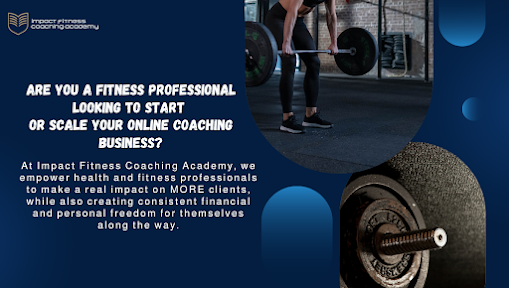Inside IFCA Nutrition Coaching: How Real Food Choices Lead to Real Results
In today’s noisy health and wellness world, most people are over the fads. They're tired of strict diets, confusing rules, and quick fixes that don’t last. What they really want? Real strategies and sustainable results—and that starts with real food.
At IFCA (Impact Fitness Coaching Academy), we believe in making nutrition simple, practical, and effective. Whether you're a fitness coach or someone just trying to make smarter food choices, understanding what’s on your plate—and why it matters—can make all the difference.
Here’s how everyday foods like almond milk, blueberries, strawberries, and peanut butter can become powerful tools in a more balanced, real-world approach to nutrition.
Why Real Food Education Beats Restrictive Diets
Good nutrition isn’t about cutting everything out—it’s about knowing what works for your body and lifestyle. At IFCA, our philosophy centers around education, not restriction.
Let’s take almond milk, for example. It’s a common choice for those avoiding dairy, but not all almond milks are created equal. Some are fortified with extra nutrients, while others might be low in protein or contain added sugars. Knowing how to read a label and make smart comparisons helps people take control of their own health without relying on “off-limits” lists.
Nutrition coaching should empower people—not scare them away from their favorite foods.
Making Sense of Superfoods: Blueberries and Strawberries
Superfoods are more than buzzwords. When people understand their benefits, they’re more likely to enjoy eating them consistently.
Blueberries are a great example. They’re packed with antioxidants, fiber, and vitamin C. They’ve even been linked to reduced inflammation, better brain function, and quicker recovery after workouts.
Strawberries have their own list of impressive benefits too. They’re low in calories, high in fiber, and loaded with vitamin C and antioxidants. These kinds of fruits are not just tasty—they’re satisfying and nourishing, making them an easy win for most nutrition plans.
Real Talk About Real Foods: Peanut Butter and Portion Awareness
Peanut butter is a fan favorite—but it’s also a perfect example of why food education matters. Yes, it’s full of healthy fats and protein, but it’s also calorie-dense. That doesn’t mean it’s “bad”—it just means portion size matters.
Understanding the nutrition facts behind foods like peanut butter helps people enjoy what they love in a way that supports their goals. It’s not about cutting it out—it’s about learning how to make it fit.
Simple Nutrition = Long-Term Success
Let’s face it—if a nutrition plan is too complicated, it won’t last. That’s why the most successful coaching approaches focus on simplicity and habits, not perfection.
Instead of telling people to cut carbs or follow strict rules, we believe in teaching balance. That means building meals that include protein, healthy fats, fiber, and carbs in the right portions. It’s about choosing whole, nutrient-dense foods most of the time—while still having room for flexibility.
Nutrition should fit into real life—not the other way around.
Helping Coaches and Clients Alike
At IFCA, we train fitness professionals to guide their clients with confidence—but the principles we teach apply to anyone looking to better understand their nutrition.
Whether it’s reading a label, explaining the difference between almond milk brands, or helping someone use peanut butter mindfully, clear communication makes all the difference. When people know the “why” behind their food choices, they’re more likely to follow through—and feel good doing it.
Final Thoughts: Keep It Real, Keep It Simple
The truth is, great nutrition doesn’t come from extremes. It comes from consistency, education, and real foods that people actually enjoy eating.
So whether you’re curious about how blueberries support recovery, why strawberries are a smart snack, or how to fit peanut butter into your plan, remember: good nutrition isn’t about perfection—it’s about progress.
And sometimes, all it takes is a little clarity and confidence to make the right choices stick.
.png)
.png)
.png)
.png)
Comments
Post a Comment